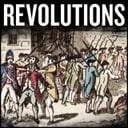
0.0- Introduction
Welcome to Revolutions.

0.0- Introduction
Welcome to Revolutions.

Dive into the compelling world of "Revolutions," a podcast that explores the tumultuous journeys of history’s most significant political upheavals. Each week, host Mike Duncan takes listeners on a riveting journey through revolutions, starting with the French Revolution and progressing into the complexities of the Haitian Revolution. What sets this podcast apart is Duncan's masterful storytelling combined with meticulous research, making each episode not just informative but an immersive experience. Listeners can expect engaging discussions with esteemed guests, including historians and authors, who shed light on pivotal moments and figures. Topics range from the intricacies of Charles Stuart's reign and his contentious relationship with Parliament to the social dynamics that fueled revolutionary fervor in various countries. Whether you’re a history buff or simply curious about the forces that shape our world, "Revolutions" invites you to rethink the past and understand the present through the lens of these transformative events.

Welcome to Revolutions.

Welcome to Revolutions.

In 1625 Charles Stuart became king of England, Scotland and Ireland. His relationship with Parliament immediately got off on the wrong foot.

In 1625 Charles Stuart became king of England, Scotland and Ireland. His relationship with Parliament immediately got off on the wrong foot.
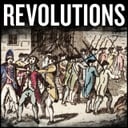
In the 1630s, King Charles ruled without Parliament. His financial policies and religious innovations annoyed many of his subjects.

In the 1630s, King Charles ruled without Parliament. His financial policies and religious innovations annoyed many of his subjects.
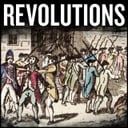
The Scots revolted after Charles tried to impose the Book of Common Prayer, forcing the King to recall Parliament.

The Scots revolted after Charles tried to impose the Book of Common Prayer, forcing the King to recall Parliament.
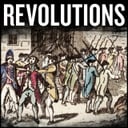
The Long Parliament convened in November 1640. Tensions ran high as Parliamentary leaders tried to assert control over the State.

The Long Parliament convened in November 1640. Tensions ran high as Parliamentary leaders tried to assert control over the State.
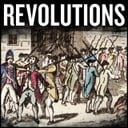
A brief description of the soldiers who fought in the English Civil Wars.

A brief description of the soldiers who fought in the English Civil Wars.
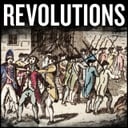
After negotiations with Parliament broke down, King Charles raised his standard in August, 1642. The opening campaigns of the First Civil War tilted in the Royalists favor.

After negotiations with Parliament broke down, King Charles raised his standard in August, 1642. The opening campaigns of the First Civil War tilted in the Royalists favor.

In late 1643, Parliament sealed a military alliance with the Scots. Their combined force defeated the Royalists at Marston Moor.

In late 1643, Parliament sealed a military alliance with the Scots. Their combined force defeated the Royalists at Marston Moor.
Now ad-free.
Download herd and enjoy uninterrupted, high-quality podcasts without the wait.
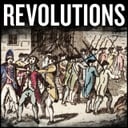
After years of muddling along, Parliament created a more professional army. They finally defeated King Charles at Nasbay in June 1645.

After years of muddling along, Parliament created a more professional army. They finally defeated King Charles at Nasbay in June 1645.
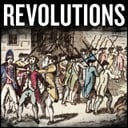
New Revolutions Tour coming in June 2014! Email: [email protected]

New Revolutions Tour coming in June 2014! Email: [email protected]

After the Battle of Naseby ended the King's chances for military victory, he became the frustrating center of post-war negotiations.

After the Battle of Naseby ended the King's chances for military victory, he became the frustrating center of post-war negotiations.

As the New Model Army debated the merits of constitutional democracy, King Charles was scheming to put himself back on the throne.

As the New Model Army debated the merits of constitutional democracy, King Charles was scheming to put himself back on the throne.
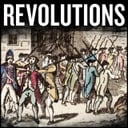
After Pride's Purge, Charles I was executed by the Rump Parliament on January 30, 1649. Then Cromwell invaded Ireland.

After Pride's Purge, Charles I was executed by the Rump Parliament on January 30, 1649. Then Cromwell invaded Ireland.

Charles II raised an army of Scots to help him claim the throne, but they were defeated by Oliver Cromwell at Dunbar and Worcester.

Charles II raised an army of Scots to help him claim the throne, but they were defeated by Oliver Cromwell at Dunbar and Worcester.

Reserve your spot for England/France June 2014 at www.historyworldtravel.com!

Reserve your spot for England/France June 2014 at www.historyworldtravel.com!

For someone who was born free John Lilburne sure spent a lot of time in prison

For someone who was born free John Lilburne sure spent a lot of time in prison
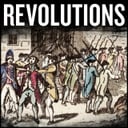
God wanted me to tell you that property is theft.

God wanted me to tell you that property is theft.

In 1653 Oliver Cromwell dissolved the Rump Parliament and then Barebone's Parliament dissolved itself. The Commonwealth was not getting off to a great start.

In 1653 Oliver Cromwell dissolved the Rump Parliament and then Barebone's Parliament dissolved itself. The Commonwealth was not getting off to a great start.
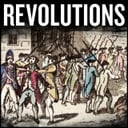
The Instrument of Government was the first written constituion in English history.

The Instrument of Government was the first written constituion in English history.
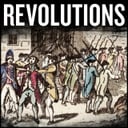
The dissolution of the First Protectorate Parliament led to the brief and unpopular Rule of the Major Generals. When the Second Protectorate Parliament was finally called they tried to make Oliver Cromwell king.

The dissolution of the First Protectorate Parliament led to the brief and unpopular Rule of the Major Generals. When the Second Protectorate Parliament was finally called they tried to make Oliver Cromwell king.

After the Puritans came to power they tried to abolish Christmas. Seriously.

After the Puritans came to power they tried to abolish Christmas. Seriously.
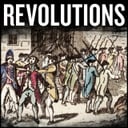
Oliver Cromwell died on September 3, 1658. His son and heir Richard was iunable to hold the Protectorate together.

Oliver Cromwell died on September 3, 1658. His son and heir Richard was iunable to hold the Protectorate together.

After serving in Parliament and the courts of both Charles I and Charles II, Edward Hyde wrote a massively influential history of the English Civil Wars.

After serving in Parliament and the courts of both Charles I and Charles II, Edward Hyde wrote a massively influential history of the English Civil Wars.
Now ad-free.
Download herd and enjoy uninterrupted, high-quality podcasts without the wait.
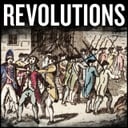
The English Monarchy was restored in 1660.

The English Monarchy was restored in 1660.
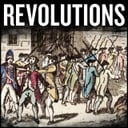
A brief tour of the Thirteen Colonies.

A brief tour of the Thirteen Colonies.

After the French and Indian War, the British Ministry started levying new taxes on the colonies. The colonists were not amused.

After the French and Indian War, the British Ministry started levying new taxes on the colonies. The colonists were not amused.

After the failure of the Stamp Act, Parliament passed a new series of taxes known as the Townshend Acts. The colonists were not amused.

After the failure of the Stamp Act, Parliament passed a new series of taxes known as the Townshend Acts. The colonists were not amused.
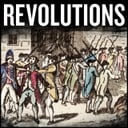
The Boston Tea Party led Parliament to pass the Intolerable Acts in 1774. The colonists were really super not amused.

The Boston Tea Party led Parliament to pass the Intolerable Acts in 1774. The colonists were really super not amused.
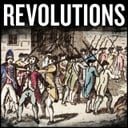
After the skirmishes at Lexington and Concord, war between Britain and the colonies broke out. George Washington was appointed commander-in-chief and laid siege to Boston.

After the skirmishes at Lexington and Concord, war between Britain and the colonies broke out. George Washington was appointed commander-in-chief and laid siege to Boston.
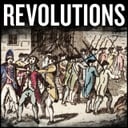
The American colonies declared independence in July 1776. Then their armies got chased around New York.

The American colonies declared independence in July 1776. Then their armies got chased around New York.

When in the course of human events...

When in the course of human events...

With the revolution on the line, George Washginton led his army to victory at Trenton. Unfortunately he would be unable to stop the British from taking Philadelphia in 1777.

With the revolution on the line, George Washginton led his army to victory at Trenton. Unfortunately he would be unable to stop the British from taking Philadelphia in 1777.
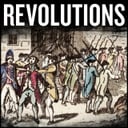
Gentleman Johnny's Party Train ran into some trouble in 1777.

Gentleman Johnny's Party Train ran into some trouble in 1777.
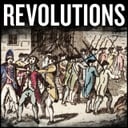
After Saratoga the French joined the war, the British changed strategies and Washington's army spent a miserable winter at Valley Forge.

After Saratoga the French joined the war, the British changed strategies and Washington's army spent a miserable winter at Valley Forge.

The Episode That Wouldn't Die.

The Episode That Wouldn't Die.
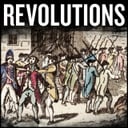
Despite the thrashing he gave Horatio Gates at the Battle of Camden, Lord Cornwallis found the Carolinas slipping out of his grasp.

Despite the thrashing he gave Horatio Gates at the Battle of Camden, Lord Cornwallis found the Carolinas slipping out of his grasp.

Lord Cornwallis was trapped in Yorktown in October 1781. His surrender ended the American War of Independence.

Lord Cornwallis was trapped in Yorktown in October 1781. His surrender ended the American War of Independence.
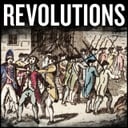
As the newly independent United States trasitioned from war to peace, it was tripped up by the ineffective Articles of Confederation.

As the newly independent United States trasitioned from war to peace, it was tripped up by the ineffective Articles of Confederation.

Between the end of the War of Independence and the Constitutional Convention the new United States was plagued by problems. The Articles of Confederation were not up to solving them.

Between the end of the War of Independence and the Constitutional Convention the new United States was plagued by problems. The Articles of Confederation were not up to solving them.

The ratification of the Constitution and the Bill of Rights marks the end of the Revolutionary Era.

The ratification of the Constitution and the Bill of Rights marks the end of the Revolutionary Era.

Hang them on the wall of every classroom.

Hang them on the wall of every classroom.

Tours. Episode Numbering. Money. Parlez-vous français?

Tours. Episode Numbering. Money. Parlez-vous français?

The population of pre-Revolutionary France was divided into Three Estates: the Church, the Nobility and Everyone Else.

The population of pre-Revolutionary France was divided into Three Estates: the Church, the Nobility and Everyone Else.

The Ancien Regime was a mess in desperate need of reform.

The Ancien Regime was a mess in desperate need of reform.

As power passed from Louis XV to Louis XVI, royal ministers attempted to implement reforms, but were thewarted at every turn.

As power passed from Louis XV to Louis XVI, royal ministers attempted to implement reforms, but were thewarted at every turn.

Just as the financial situation was about to explode the monarchy was hit by a public relations nightmare.

Just as the financial situation was about to explode the monarchy was hit by a public relations nightmare.

King Louis called the Assembly of Notables in early 1787 to approve a major fincancial reform package. But intead of rubber stamping the initiatives, the Notables scrutinized every detail.

King Louis called the Assembly of Notables in early 1787 to approve a major fincancial reform package. But intead of rubber stamping the initiatives, the Notables scrutinized every detail.
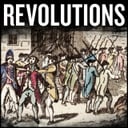
Round and round and round it goes...

Round and round and round it goes...
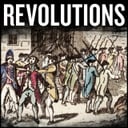

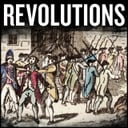
The king's attempt to break the Parments in the summer of 1788 was was met by widespread resistence.

The king's attempt to break the Parments in the summer of 1788 was was met by widespread resistence.
Now ad-free.
Download herd and enjoy uninterrupted, high-quality podcasts without the wait.